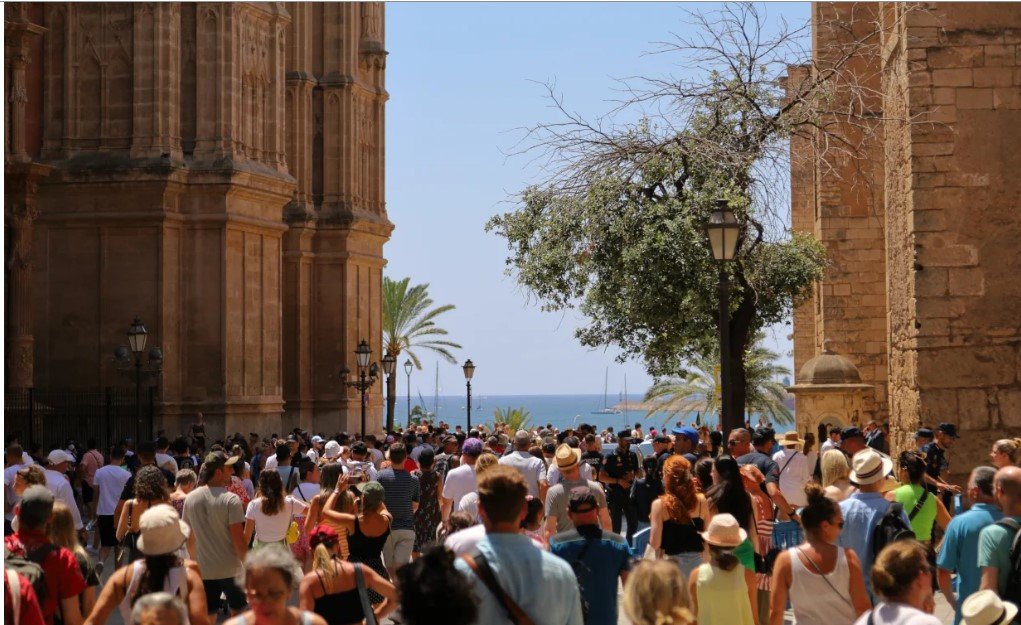The state of tourism in the post-Covid era surpasses any previous one. People want and still want very much to travel, thinking that they will arrive before another pandemic and we are forced this time to close our country for more than 2 years. And the islands are the most difficult position. Everyone wants to go to them, the availability and absorption capacity is less than the demand, but the local authorities in each area rarely set limits.
on Spain, things are unbearable in many places, such as the Canary Islands and the Balearic Islands, the situation is now at a point whereolemic. There is almost no violence against tourists.
Usually what happened a few days ago in Mallorca and Menorca, but also earlier in the Canary Islands, where more than 10,000 people demonstrated against excessive tourism and asked the country’s authorities to take measures to limit tourists’ access to the areas where their houses are located.
This is a fact that one also encounters in the villages and towns of the coast of Italy. The areas there are structured in such a way that with every step you take, you are likely to step on private land. Or take pictures of people’s houses they don’t know and, of course, like.
In some places in Menorca and Majorca people gather to close the entrances to their small communities to tourists, because going in there automatically means that more people will stop to take pictures of their personal property, perhaps themselves.
This is typicalIt happened in Binibeca Vel, a resort in Menorcaa so-called “Mykonos of Spain”, where 200 house owners put the area on lockdown to prevent tourists from their private areas.
Although tourism brings a lot of money to the resort, the number that flocks there every year is more than what the area can handle and there are no restrictions. 500 permanent residents, close to 800,000 visitors per yearusually for a day excursion.
A basic and basic request of the people there is that the entrance starts at 11 am and at 8 pm the resort is empty of non-locals.
The situation is out of hand, that the locals can’t stand the noise, but also in search of a good selfietourists do not respect the boundaries of houses, they can reach the balconies, stairs and disturb the privacy and peace of the locals. Unintentionally, obviously.
In a more long-term and effective plan, residents are considering a resolution to ban tourism in August, which is the peak season.
Such is the general psychology of these parts of Spain, that there was an incident in Palma in Majorca, where tourists can hear crowds of locals cheering and taunting them as they dine in restaurants in the area, in Plaza Weyler and around Paseo del Borne.
In the next steps of the inhabitants of the Balearic Islands, there will also be a demonstration on July 21, with a call to all the islands and the whole of eastern Spain.
Our own islands will soon be called upon to make such decisions
What you have donei’m in spain, this is happening to a mild degree in Italy, where we have seen Rome, Venice and Portofino announce measures to limit tourist activity in those areas, whether we are talking about travel time or the plague of selfies.
In GREECE, no local reaction was observed at either siteat least no one can be heard, except for possible fermentations that occur in their Santorini recent months and of course last year’s Towel Movement, which, however, does not care about tourists, but the prices of sunbeds and the fact that they leave a free space on the beaches.
And that is an issue. Because even without perception in the hyper tourism delivered and the locals of the 10-11 famous islands focus on the money coming in if there are any actions that are not well publicized or silenced in the name of money.
However, maintaining a situation in the islands where people go to work for a time in such weather conditions, staying in unsuitable houses/rooms, with at best a day off a month, something inhumane and a dead end. You get to the point where you don’t feel like going on vacation and sitting in a store to order.
So good on We take examples from Spain, a country where the locals have always resisted the tourism corporation, which faced Airbnb and prevented it, because we will certainly be called to manage issues that are more serious for the sustainability of the islands.

